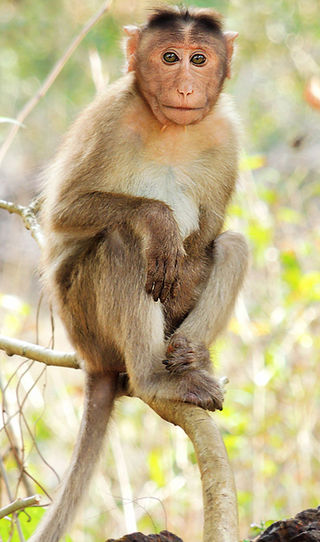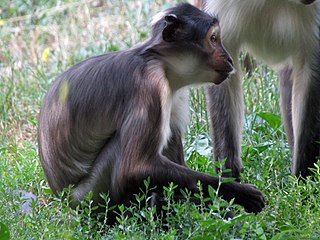
Penguins are a group of aquatic flightless birds from the family Spheniscidae of the order Sphenisciformes. They live almost exclusively in the Southern Hemisphere: only one species, the Galápagos penguin, is found north of the Equator. Highly adapted for life in the ocean water, penguins have countershaded dark and white plumage and flippers for swimming. Most penguins feed on krill, fish, squid and other forms of sea life which they catch with their bills and swallow whole while swimming. A penguin has a spiny tongue and powerful jaws to grip slippery prey.

Herring are forage fish, mostly belonging to the family of Clupeidae.

The macaques constitute a genus (Macaca) of gregarious Old World monkeys of the subfamily Cercopithecinae. The 23 species of macaques inhabit ranges throughout Asia, North Africa, and Europe. Macaques are principally frugivorous, although their diet also includes seeds, leaves, flowers, and tree bark. Some species such as the long-tailed macaque will supplement their diets with small amounts of meat from shellfish, insects, and small mammals. On average, a southern pig-tailed macaque in Malaysia eats about 70 large rats each year. All macaque social groups are arranged around dominant matriarchs.

The guenons are Old World monkeys of the genus Cercopithecus. Not all members of this genus have the word "guenon" in their common names; also, because of changes in scientific classification, some monkeys in other genera may have common names that include the word "guenon". Nonetheless, the use of the term guenon for monkeys of this genus is widely accepted.

Trachypithecus is a genus of Old World monkeys containing species known as lutungs, langurs, or leaf monkeys. Their range is much of Southeast Asia.

The white-eyelid mangabeys are African Old World monkeys belonging to the genus Cercocebus. They are characterized by their bare upper eyelids, which are lighter than their facial skin colouring, and the uniformly coloured hairs of the fur. The other two genera of mangabeys, Lophocebus and Rungwecebus, were once thought to be very closely related to Cercocebus, so much so that all the species were placed in one genus, but Lophocebus and Rungwecebus species are now understood to be more closely related to the baboons in genus Papio, while the Cercocebus species are more closely related to the mandrill.

Blanford's bat, also known as the least false-serotine bat, is a species of vesper bat. It can be found in Brunei, Cambodia, Indonesia, Laos, Malaysia, Myanmar and Thailand, where it lives in various different forested habitats. The International Union for Conservation of Nature has assessed its conservation status as being of "least concern".
The false serotine bat is a species of vesper bat. It is found only in Malaysia.

Gaskell's false serotine is a species of vesper bat. It is found only in Indonesia.

Tickell's bat is a species of vesper bat. It can be found in Bangladesh Bhutan, Cambodia, possibly China, India, Myanmar, Nepal, Sri Lanka and Thailand.

Hesperoptenus is a genus of bats within the Vespertilionidae or vesper bat family.

Eptescini is a tribe of bats in the family Vespertilionidae. This tribe has a cosmopolitan distribution.











